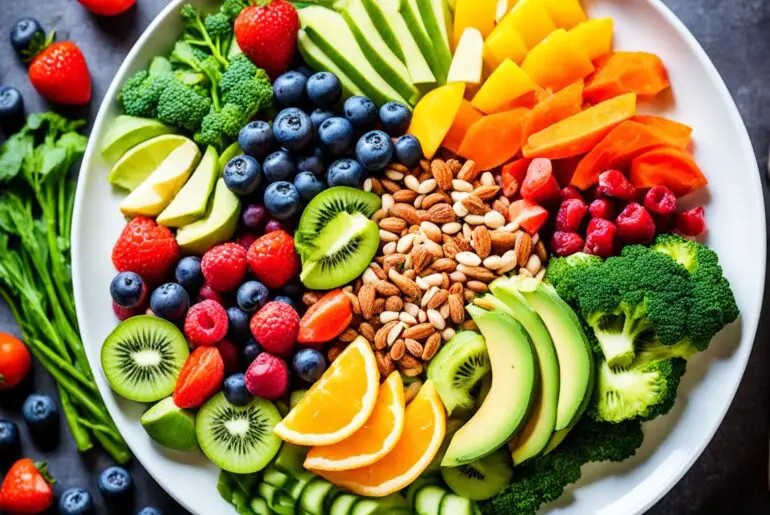Did you know that the HCG diet, known for its potential weight loss benefits, has no scientific evidence to support its effectiveness? Despite its popularity, the Food and Drug Administration (FDA) does not approve over-the-counter HCG weight-loss products, raising concerns about their safety and long-term outcomes.
The HCG diet involves severe calorie restriction and the use of the hormone human chorionic gonadotropin (HCG), primarily used to treat fertility issues. While some may experience initial weight loss during the diet, there are risks associated with such extreme calorie restriction, including gallstone formation, irregular heartbeat, nutrient deficiencies, and electrolyte imbalances. Furthermore, research has suggested a potential increase in cancer risk associated with HCG weight-loss products.
So, are HCG diet results permanent? In this article, we will explore the sustainability of HCG diet outcomes and discuss safer and more sustainable options for weight loss that involve balanced diets and regular exercise.
Key Takeaways:
- The HCG diet lacks scientific evidence to support its effectiveness.
- Severe calorie restriction and the use of HCG pose risks and potential health concerns.
- Safer and more sustainable options for weight loss include balanced diets and regular exercise.
- Permanent weight loss requires long-term lifestyle changes.
- Consulting with a healthcare provider is important for personalized guidance and support.
The Truth About HCG Diet Safety and Effectiveness
The use of HCG weight-loss products has become popular due to their potential for weight loss. However, it’s important to explore the safety and effectiveness of the HCG diet before pursuing this approach. The Food and Drug Administration (FDA) strongly advises against the use of over-the-counter HCG weight-loss products because of safety concerns. These products are not approved for over-the-counter weight loss, and their labels explicitly state that they are not effective for weight loss. The severe calorie restriction associated with the HCG diet may lead to short-term weight loss.*, but it also poses risks *. These risks include gallstone formation, irregular heartbeat, nutrient deficiencies, and electrolyte imbalances. Additionally, there is a possible increase in cancer risk associated with HCG weight-loss products.*
While some individuals may experience short-term weight loss on the HCG diet, it’s crucial to consider the potential risks and consult with a healthcare provider for safer and more sustainable weight loss methods. It’s important to prioritize your well-being and make informed decisions about your weight loss journey.
Risks of the HCG Diet
| Risks | Description |
|---|---|
| Gallstone formation | The severe calorie restriction may increase the risk of developing gallstones, which can be painful and require medical intervention. |
| Irregular heartbeat | The HCG diet’s extreme calorie restriction may lead to electrolyte imbalances, potentially causing irregular heart rhythms. |
| Nutrient deficiencies | The limited food choices on the HCG diet can result in inadequate nutrient intake, leading to deficiencies in essential vitamins and minerals. |
| Electrolyte imbalances | The HCG diet’s restrictive nature may disrupt electrolyte balance, affecting various bodily functions and potentially causing health complications. |
“The FDA advises against using over-the-counter HCG weight-loss products due to safety concerns.” – FDA
It’s important to prioritize your health and consider the potential risks and benefits of any weight loss approach. Consult with a healthcare provider who can guide and support you in making informed decisions about your weight loss journey. Your well-being should always be at the forefront of your weight loss efforts.
Maintaining Weight Loss After the HCG Diet

After completing the HCG diet, many individuals find it challenging to maintain their weight loss. This difficulty is often attributed to the body’s response to the severe calorie restriction experienced during the diet. When calorie intake is increased after the diet, the body may interpret it as a signal to store more calories as a protective measure.
To prevent weight regain and achieve long-term success with the HCG diet, it is crucial to adopt a gradual approach in increasing calorie intake, reintroducing a balanced diet, and establishing an exercise routine. Gradually increasing calorie intake can help prevent the body from entering fat-storing mode, thereby maintaining the achieved weight loss.
Reintroducing a normal diet should be done slowly and methodically. Paying close attention to weight changes and making adjustments as needed is essential during this process. By monitoring one’s weight and progress, it becomes easier to identify any triggers that may lead to weight regain and modify eating habits accordingly.
Engaging in regular exercise is another critical aspect of maintaining weight loss after the HCG diet. Exercise not only helps in burning calories but also preserves muscle mass, which is crucial for long-term weight maintenance. By incorporating at least 150 minutes of moderate exercise or 75 minutes of vigorous exercise per week, individuals can support their weight loss efforts.
It is important to note that sustaining weight loss requires a comprehensive approach that goes beyond the HCG diet alone. Making long-term lifestyle changes, focusing on a balanced diet, regular physical activity, and mindful eating habits, is vital for permanent weight loss. While the HCG diet can provide the motivation and foundation for healthier habits, it is essential to continue making conscious choices and seeking ongoing support to achieve and sustain lasting weight loss goals.
Quote:
“Gradually increasing calorie intake, reintroducing a balanced diet, and establishing an exercise routine are key to maintaining weight loss after the HCG diet.” – Expert Nutritionist
Maintaining weight loss after completing the HCG diet requires a dedicated effort to gradually increase calorie intake, reintroduce a balanced diet, and establish a regular exercise routine. By following these steps and maintaining healthy lifestyle habits, individuals can achieve long-term success with the HCG diet.
How to Gradually Increase Calorie Intake
To maintain weight loss after completing the HCG diet, it is important to approach post-diet calorie intake with care. An abrupt increase in calorie consumption can lead to weight regain. To avoid this, it is recommended to gradually increase calorie intake by around 200 kcal per week until reaching a balanced daily calorie level.
Let’s say you recently completed the HCG diet and you weigh 130 pounds. To calculate your optimal daily calorie intake, simply multiply your weight by 13. In this case, your recommended daily calorie intake would be 1690 kcal.
Gradual Increase in Calorie Intake
By increasing calorie intake gradually, you allow your body to adjust and prevent it from going into fat-storing mode. This approach gives your metabolism time to regulate and adapt to the increased energy intake. It is important to monitor your weight changes during this process and make adjustments if necessary.
Remember, it is crucial to avoid prolonging the 500-800 calorie diet beyond the HCG diet period. Continuing an extremely low-calorie diet for an extended period could signal the body to store fat instead of maintaining weight loss.
Ensuring Safe Weight Maintenance
Gradually increasing calorie intake after the HCG diet not only helps prevent weight regain but also supports a healthier approach to weight maintenance. Pairing the calorie increase with reintroducing a balanced diet and establishing an exercise routine can optimize long-term weight management.
It is important to emphasize that every person’s caloric needs are unique. Consulting with a healthcare professional or registered dietitian can provide personalized guidance and support in developing an appropriate post-diet plan.
| Weeks After HCG Diet | Calorie Increase per Week | Total Calorie Intake (Example: 130 lb individual) |
|---|---|---|
| 1 | +200 | 1690 |
| 2 | +400 | 1890 |
| 3 | +600 | 2090 |
| 4 | +800 | 2290 |
| 5 | +1000 | 2490 |
Reintroducing a Balanced Diet

After completing the HCG diet, it’s important to gradually reintroduce a balanced diet into your daily eating habits. During the HCG diet, certain foods, particularly sugars and starchy foods, were restricted to promote weight loss. Now that you’ve completed the diet, it’s time to slowly reintroduce these foods back into your meals.
Start by incorporating low-carb and low-fat options into your diet. This can include foods like lean proteins, fruits, vegetables, whole grains, and healthy fats. By gradually reintroducing these food groups, you allow your body to readjust to normal eating patterns while still maintaining the weight loss achieved during the HCG diet.
It’s important to monitor your weight changes as you reintroduce these foods. This will help you identify any potential triggers for weight regain and make necessary adjustments to your diet. By paying attention to how your body responds to different foods, you can create a balanced and personalized eating plan that supports your long-term weight maintenance goals.
Remember, the key to a balanced diet is moderation. While it’s important to enjoy a wide variety of foods, it’s also crucial to eat them in appropriate portion sizes. Be mindful of your calorie intake and make adjustments as needed to ensure you’re consuming the right amount for your body’s needs.
The Benefits of a Balanced Diet After the HCG Diet
Reintroducing a balanced diet after the HCG diet offers several benefits. Here are a few reasons why it’s important to embrace healthy eating habits:
- Improved Nutrient Intake: A balanced diet provides your body with the essential nutrients it needs to function optimally. By including a variety of fruits, vegetables, lean proteins, whole grains, and healthy fats, you ensure that you’re getting a wide range of vitamins, minerals, and other important nutrients.
- Sustainability: Unlike fad diets, a balanced diet is sustainable in the long run. It promotes a healthy relationship with food and can be maintained for a lifetime, making it easier to maintain weight loss and support overall health and well-being.
- Energy Levels: Opting for a balanced diet helps stabilize blood sugar levels, preventing energy crashes and promoting sustained energy throughout the day. By including complex carbohydrates, lean proteins, and healthy fats, you provide your body with the fuel it needs to function at its best.
- Mood and Mental Well-being: A well-balanced diet has been linked to improved mood and mental well-being. Nutrient deficiencies can contribute to mood swings, irritability, and low energy levels. By nourishing your body with a balanced diet, you support your brain health and emotional well-being.
Embrace the power of a balanced diet and make healthy eating a priority after completing the HCG diet. By reintroducing foods gradually and focusing on moderation, you can create a sustainable eating plan that supports your long-term weight maintenance goals.
Establishing an Exercise Routine
During the HCG diet, strenuous exercise is not recommended due to the low-calorie intake. However, after completing the diet and gradually increasing calorie intake, it is important to incorporate regular exercise into the routine. Regular physical activity plays a vital role in maintaining weight loss and promoting overall health and well-being.
Engaging in exercise after the HCG diet helps to…
1. Maintain Weight Loss:
Exercise After HCG Diet is crucial for sustaining weight loss achieved during the diet. It helps in burning calories, preserving muscle mass, and preventing the regain of lost weight. Aim for at least 75 minutes of vigorous exercise or 150 minutes of moderate exercise per week. This can include activities like cardio, resistance training, brisk walking, biking, or Zumba.
2. Boost Metabolism:
Regular physical activity improves metabolic rate, allowing the body to burn calories more efficiently. Exercise stimulates muscle growth, and muscles are more metabolically active than fat. This means that increased muscle mass leads to a higher resting metabolic rate, helping to maintain weight loss.
Maintaining an exercise routine after the HCG diet not only helps maintain weight loss but also provides various other health benefits.
3. Enhance Overall Health:
Maintaining an exercise routine after the HCG diet not only helps maintain weight loss but also provides various other health benefits. Regular exercise reduces the risk of chronic diseases such as heart disease, diabetes, and certain types of cancer. It also improves cardiovascular health, strengthens bones, boosts energy levels, and enhances mood and mental well-being.
4. Find Activities You Enjoy:
To make exercise a sustainable habit, choose activities that you enjoy and that fit into your lifestyle. This increases the likelihood of sticking to your exercise routine. Whether it’s cycling, dancing, swimming, or playing a team sport, find activities that make you feel motivated and engaged.
Remember to consult with a healthcare professional before starting any new exercise routine, especially if you have any underlying health conditions or concerns.
The Role of HCG in Weight Loss
HCG, or human chorionic gonadotropin, is a hormone naturally produced in the body and is believed to play a role in weight loss by mobilizing fat stores. How HCG supports weight loss is through its interaction with the body’s metabolism and adipose tissue. Although HCG is more abundant during pregnancy, small amounts of this hormone can be used to stimulate the release of stored fat, particularly in areas like the abdomen, hips, and upper thighs.
When combined with a very low-calorie diet, HCG can enhance fat loss, providing an additional mechanism to support weight loss efforts. The HCG diet includes strict calorie restriction, typically ranging from 500 to 800 calories per day, along with the administration of HCG hormone, either through injections, pellets, or drops. The combination of HCG and calorie restriction is what contributes to the initial weight loss observed during the HCG diet.
It is important to note that HCG alone does not cause weight loss. The hormone works in conjunction with the low-calorie diet, helping to target and utilize stored fat for energy. Mechanisms of HCG in weight loss involve the hormone’s effect on metabolism and its ability to promote the breakdown of adipose tissue. However, the long-term effects of using HCG for weight loss are not thoroughly supported by scientific evidence, and the safety and effectiveness of the HCG diet have been a subject of debate.
To develop a comprehensive understanding of weight loss and achieve sustainable results, it is always recommended to consult with a healthcare professional and explore alternative approaches that prioritize balanced nutrition, regular exercise, and healthy lifestyle habits. HCG’s effect on metabolism contributes to the unique nature of the HCG diet, but it does not replace a holistic approach to weight management.
HCG Diet Duration and Weight Loss Expectations

The HCG diet typically lasts for around 42 days. During this period, individuals can expect to see significant weight loss, with an average of 1-2 pounds per day in the initial phase. However, as the diet progresses, the rate of weight loss may slow down, and a plateau phase may be reached. It is important not to be discouraged by a plateau, as the body may still be undergoing positive changes, such as losing inches, even if weight loss seems to stall temporarily.
If you experience a plateau that persists for four or more days, there are strategies you can implement to break through it and continue with your weight loss journey. One approach is to vary your caloric intake by having a “cheat day” where you consume a slightly higher number of calories than usual but still within the limits of the diet. This can shock your body out of the plateau and restart your weight loss progress.
Another strategy is to review your food choices and ensure that you are following the HCG diet guidelines strictly. Sometimes, small deviations from the approved list of foods can hinder weight loss. Reassess your meal plan and eliminate any potential culprits that may be causing the plateau.
Additionally, incorporating exercise into your routine can help overcome a weight loss plateau. Physical activity not only burns calories but also boosts metabolism and builds lean muscle mass, which can aid in weight loss. Consider adding both cardiovascular exercises, such as running or cycling, and strength-training exercises, such as weightlifting or resistance training, to your fitness regimen.
Remember, weight loss journeys vary for individuals, and plateaus are a normal part of the process. Stay focused, motivated, and patient. Consult with a healthcare professional or a registered dietitian for personalized guidance and support to optimize your weight loss efforts.
| Phase | Duration | Weight Loss Expectations |
|---|---|---|
| First week | 7 days | Significant weight loss, around 7-14 pounds |
| Following weeks | Weeks 2-6 | Gradual weight loss, around 1-2 pounds per day or 7-14 pounds per week |
| Plateau phase | Variable | Temporary weight loss stall, but potential inch loss |
Addressing Common Side Effects and Concerns

The HCG diet is known for its potential weight loss benefits, but it may also come with certain side effects that need to be addressed. Two common concerns reported by individuals on the HCG diet are headaches and constipation.
Headache and HCG Diet
Headaches can occur, especially during the first few days of starting the HCG diet. These headaches are usually mild and can be managed with over-the-counter pain relievers. However, it’s important to consult with a healthcare provider before taking any medication to ensure compatibility with the diet and address other potential causes of headaches.
Constipation and HCG Diet
Constipation can also be a side effect of the HCG diet due to the limited fiber intake. Increasing water consumption and incorporating fiber supplements can help alleviate constipation. It’s vital to stay hydrated and ensure a healthy and regular bowel movement to maintain overall well-being during the diet.
Additionally, it’s important to note that dehydration can sometimes be mistaken for hunger. It is crucial to drink enough water throughout the day and listen to the body’s signals to differentiate between thirst and hunger cravings.
While side effects such as headaches and constipation are generally minimal, it is vital to undertake the HCG diet under the care of a physician. They can provide guidance, monitor your progress, and address any concerns that may arise during the diet.
It is important to prioritize your health and well-being, and if you experience severe or persistent side effects, it is essential to seek medical attention. Open communication with your healthcare provider will enable them to provide appropriate guidance and support throughout your HCG diet journey.
The Reality of Permanent Weight Loss

Like any other diet, the HCG diet does not guarantee permanent weight loss. It is designed to provide a jumpstart or kickstart to a healthier lifestyle. Sustained weight loss requires long-term lifestyle changes, including a balanced diet, regular physical activity, and mindful eating habits. The HCG diet can serve as a motivator and a foundation for developing healthier habits, but it is essential to continue making conscious choices to maintain weight loss in the long run.
Implementing Lifestyle Changes for Sustainable Weight Loss
To achieve permanent weight loss and ensure the sustainability of your progress, it is crucial to make lasting lifestyle changes. These changes go beyond the limitations of a specific diet or intervention. They involve adopting a balanced diet that incorporates all essential nutrients and is suitable for long-term adherence.
Regular physical activity is another key component of maintaining weight loss. Engaging in exercise not only helps burn calories but also strengthens muscles and improves overall fitness. Find activities that you enjoy and make them part of your daily routine. Whether it’s cycling, swimming, jogging, or joining group fitness classes, the important thing is to stay active consistently.
Mindful eating habits are also essential for sustaining weight loss. This involves paying attention to your body’s hunger and fullness cues, eating slowly, and savoring each bite. Avoid emotional or impulsive eating and be mindful of portion sizes. Focus on nourishing your body with nutrient-dense foods and limit the consumption of processed and high-calorie snacks.
By implementing these gradual, long-term changes to your lifestyle, you can create a sustainable foundation for weight maintenance and achieve permanent results.
“Permanent weight loss is not a one-size-fits-all approach. It requires commitment, consistency, and a holistic approach to health and wellness.”
– Dr. Jane Mitchell, Nutrition Expert
The Benefits of Permanent Weight Loss
Permanent weight loss offers numerous benefits beyond a smaller number on the scale. It can improve overall health, reduce the risk of chronic diseases such as heart disease and diabetes, increase energy levels, improve mood, and enhance self-confidence and body image.
By making lifestyle changes and maintaining a healthy weight in the long term, you prioritize your well-being and set the stage for a healthier, happier life.
Achieving Lasting Results
While the HCG diet may provide initial weight loss, it is essential to recognize that permanent weight loss relies on sustainable lifestyle changes. Embrace the journey of creating a healthier lifestyle and focus on making small, consistent improvements rather than seeking quick fixes.
Remember, achieving lasting results is not just about the number on the scale but also about feeling healthier, stronger, and more confident in yourself. Embrace the long-term commitment to a balanced diet, regular exercise, and mindful habits to achieve permanent weight loss and true well-being.
| Benefits of Permanent Weight Loss | Results of Sustainable Lifestyle Changes |
|---|---|
| Improved overall health | Reduced risk of chronic diseases |
| Increased energy levels | Improved mood and well-being |
| Enhanced self-confidence | Improved body image |
Conclusion
The HCG diet has gained significant attention for its potential benefits in weight loss. However, it is crucial to evaluate the safety, effectiveness, and long-term sustainability of this diet. Over-the-counter HCG weight-loss products are not approved by the FDA due to potential risks associated with severe calorie restriction. While the HCG diet may lead to short-term weight loss, it may not provide lasting results.
To maintain weight loss and achieve long-term success, it is essential to focus on gradual increases in calorie intake, reintroducing a balanced diet, and incorporating regular exercise. Permanent weight loss requires sustained lifestyle changes rather than relying solely on any specific diet or intervention. It is advised to work with a healthcare provider who can offer personalized guidance and support in reaching your lasting weight loss goals.
When considering weight loss methods, it’s important to prioritize safety, evidence-based effectiveness, and the ability to maintain results in the long term. Sustainable approaches that emphasize healthy dietary choices, regular physical activity, and positive lifestyle changes are more likely to lead to lasting weight loss and improved overall well-being.
FAQ
Are HCG Diet Results Permanent?
Like any other diet, the HCG diet does not guarantee permanent weight loss. Sustained weight loss requires long-term lifestyle changes, including a balanced diet, regular physical activity, and mindful eating habits. The HCG diet can serve as a motivator and a foundation for developing healthier habits, but it is essential to continue making conscious choices to maintain weight loss in the long run.
What is the truth about HCG diet safety and effectiveness?
The FDA does not approve over-the-counter HCG weight-loss products, and severe calorie restriction can pose risks and may not lead to long-term weight loss. The use of HCG weight loss products has been linked to a possible increase in cancer risk, and the extreme calorie restriction associated with the HCG diet can lead to risks such as gallstone formation, irregular heartbeat, nutrient deficiencies, and electrolyte imbalances. It is important to seek guidance from a healthcare provider for safer and more sustainable weight loss methods.
How can I maintain weight loss after the HCG diet?
To maintain weight loss after the HCG diet, it is important to gradually increase calorie intake, reintroduce a balanced diet, and establish an exercise routine. Gradual increases in calorie intake can help prevent the body from going into fat-storing mode. Reintroducing a normal diet slowly, monitoring weight changes, and engaging in regular exercise can support long-term weight maintenance.
How can I gradually increase calorie intake after the HCG diet?
An abrupt increase in calorie intake after the HCG diet can lead to weight regain. It is recommended to gradually increase calorie intake by around 200 kcal per week until reaching a balanced daily calorie level. The optimal daily calorie intake can be calculated by multiplying current weight by 13. It is important to monitor weight changes during this gradual increase and make adjustments if necessary. It’s also crucial to avoid prolonging the 500-800 calorie diet beyond the HCG diet period, as this can signal the body to store fat.
How do I reintroduce a balanced diet after the HCG diet?
During the HCG diet, certain foods are restricted, particularly sugars and starchy foods. After completing the diet, it is important to gradually reintroduce these foods into the daily diet. This should be done slowly and in moderation. Starting with low-carb and low-fat options and monitoring weight changes can help identify any potential triggers for weight regain. It is essential to maintain a balanced diet and make dietary adjustments as needed, giving the body time to readjust to normal eating patterns.
How can I establish an exercise routine after the HCG diet?
During the HCG diet, strenuous exercise is not recommended due to the low-calorie intake. However, after completing the diet and gradually increasing calorie intake, it is important to incorporate regular exercise into the routine. To maintain weight loss, it is generally recommended to engage in at least 75 minutes of vigorous exercise or 150 minutes of moderate exercise per week. Regular exercise helps to burn calories, preserve muscle mass, and support long-term weight maintenance.
What is the role of HCG in weight loss?
HCG, a hormone naturally produced in the body, is believed to aid in weight loss by mobilizing fat stores. When combined with a very low-calorie diet, HCG can enhance fat loss. However, it is important to note that HCG alone does not cause weight loss. The combination of HCG and calorie restriction is what contributes to the initial weight loss observed during the HCG diet.
How long does the HCG diet last and what weight loss can I expect?
The HCG diet typically lasts for around 42 days. During the initial phase, weight loss can be significant, usually around 1-2 pounds per day. However, as the diet progresses, the rate of weight loss may slow down, and a plateau phase may be reached. It is important not to be discouraged by a plateau, as the body may still be losing inches even if weight loss stalls temporarily. If the plateau persists for four or more days, strategies can be implemented to break through it and continue with weight loss.
What are the most common side effects and concerns of the HCG diet?
The HCG diet may lead to certain side effects, such as headaches and constipation, especially during the first few days. These symptoms can usually be relieved with over-the-counter pain relievers for headaches and increased water intake and fiber supplementation for constipation. It is important to stay hydrated and listen to the body’s signals, as dehydration can sometimes be mistaken for hunger. While side effects are generally minimal, it is important to undertake the HCG diet under the care of a physician.
Is permanent weight loss achievable?
Like any other diet, the HCG diet does not guarantee permanent weight loss. Sustained weight loss requires long-term lifestyle changes, including a balanced diet, regular physical activity, and mindful eating habits. The HCG diet can serve as a motivator and a foundation for developing healthier habits, but it is essential to continue making conscious choices to maintain weight loss in the long run.
What is the conclusion about HCG diet results?
The HCG diet has gained attention for its potential weight loss benefits. However, it is important to consider the safety, effectiveness, and sustainability of this diet. The FDA does not approve over-the-counter HCG weight-loss products, and severe calorie restriction can pose risks and may not lead to long-term weight loss. To maintain weight loss, gradual increases in calorie intake, reintroduction of a balanced diet, and regular exercise are important. Permanent weight loss requires sustained lifestyle changes rather than relying solely on a specific diet or intervention. It is advised to consult with a healthcare provider for personalized guidance and support in achieving lasting weight loss goals.




